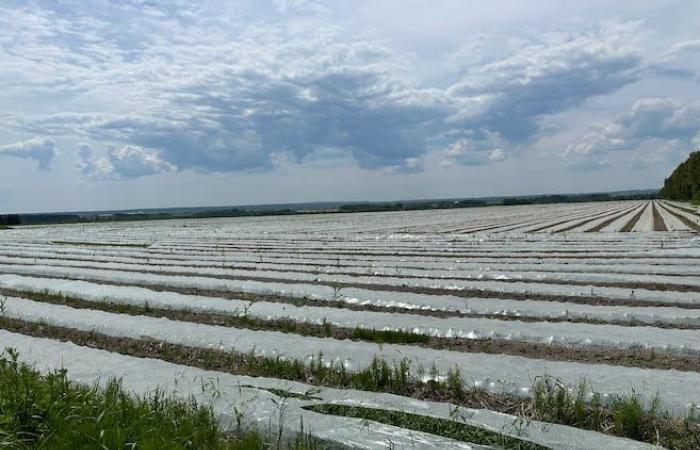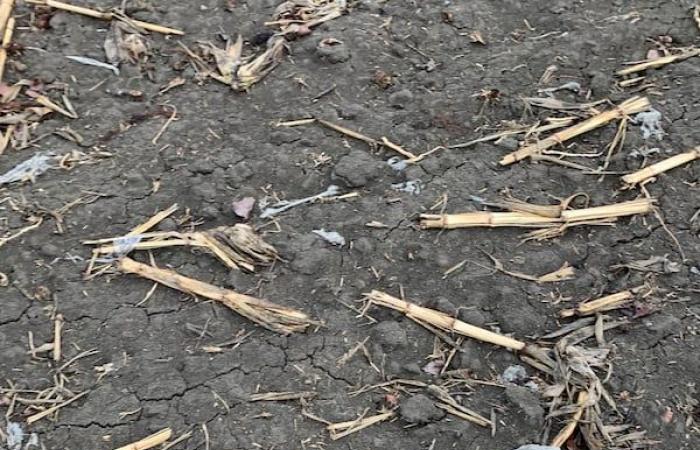Some of these mulches are marketed as oxobiodegradable. Thanks to an additive, the polyethylene supposed to disintegrate into small fragments under the effect of UV rays is presented as being able to then be broken down by micro-organisms. This assertion, however, is disputed. “The complete biodegradation of oxobiodegradable plastics is far from unanimous in the scientific literature,” emphasize the UQAC researchers. Their study, entitled Significant increase in areas covered by plastic mulch in Saguenay-Lac-Saint-Jean, Quebec, Canadareveals a 90% increase in the use of these mulches in the region over the last seven years. This article, currently under peer review, will be published in the Canadian Journal of Soil Science.
According to the literature review carried out, the degradation rate varies from 0 to 92% in the laboratory. In the fields, a study carried out in Greece discovered many small fragments of plastic after 82 months. Observations in the fields made by the UQAC team demonstrated the presence of plastic macro-fragments up to five years after their application.
In their field observations, the researchers observed the formation of microplastics (white powder) on the soil aggregate. (UQAC)
“When plastic is not exposed to light, it fragments very little and then behaves a bit like an ordinary plastic bag that has been buried in the ground,” explains Maxime Paré, agronomist and lead author. of the UQAC study. When plastic is exposed to light, it breaks into very small pieces [microplastiques]small fragments that are difficult to see with the naked eye and which are difficult for microorganisms to decompose. The literature is clear on this subject, a large proportion of these microplastics remain in the environment for a very long time, several years, even decades. Using plastic mulch to produce corn on a large scale is nonsense in 2024.”
Effective for growing corn in northern areas
Imported from Ireland nearly a decade ago, plastic mulch allows corn to be planted, herbicides to be applied and everything to be covered with a seven-micrometer (0.007 mm) film in a single pass. This film increases soil temperature, thereby optimizing corn or soybean yield in a northern climate. Many dairy producers in Saguenay-Lac-Saint-Jean use this technology to produce corn silage to feed their cows.
Plastic residues have been observed up to five years after their application in the field.
A risk of accumulation in dairy products
In addition to the negative impacts on soils, documentation also establishes that the fragmentation of mulch, made of low density polyethylene, releases plasticizers from the phthalate family into the environment.
“Phthalates are known to be endocrine disruptors responsible for several health problems, including breast and prostate cancers,” underlines the study. Ingested by a dairy cow via silage corn, these same phthalates will subsequently be preferably found in the animal’s fat-soluble substances such as fats and milk, to then be reconcentrated further in processed milk products such as butter and cheeses. For all these reasons, the accumulation and degradation of plastic mulches in our agricultural soils deserve our full attention, especially in the dairy context where a cow during lactation can ingest more than 35 kg of corn silage. per day.”
The dispersion of fragments into aquatic environments can also cause significant problems, in particular because of the bioaccumulation of phthalates in plankton and fish.
Recommendations: stop using plastic mulch
“Faced with this relatively worrying observation, our recommendation – based on science – is to cease the use of plastic mulch as soon as possible,” declare the researchers. They propose exploring other crops, such as barley and oats, to meet the silage needs of dairy producers in the region, or developing new corn hybrids to eliminate the use of mulch. plastics. Adopting bio-based mulches could also be an interesting option.







